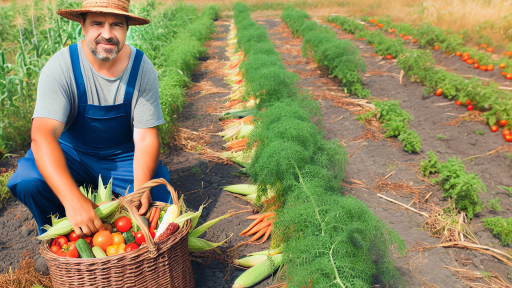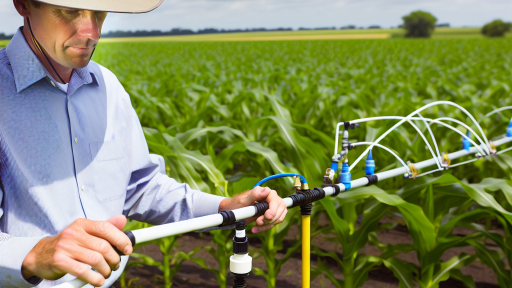Introduction to Agri-Tourism
Agri-tourism blends agriculture with tourism.
It offers visitors the chance to experience farms directly.
This approach typically includes farm tours, workshops, and activities.
Many farms diversify their income through agri-tourism.
It helps farmers connect with consumers personally.
Furthermore, it promotes local culture and products.
Definition of Agri-Tourism
Agri-tourism encompasses activities that allow the public to enjoy agricultural settings.
It can involve staying on a farm or participating in farming tasks.
Visitors may engage in fruit picking or livestock feeding.
These activities enhance the understanding of food sources.
Overview of Agri-Tourism Trends
Interest in agri-tourism has surged in recent years.
Many people seek authentic experiences in nature.
Moreover, consumers are increasingly interested in local food sources.
Reports indicate that agri-tourism contributes significantly to rural economies.
Benefits of Agri-Tourism
Agri-tourism offers multiple benefits for farmers.
Transform Your Agribusiness
Unlock your farm's potential with expert advice tailored to your needs. Get actionable steps that drive real results.
Get Started- Additional revenue streams from tourism-related activities.
- Increased visibility and marketing for farm products.
- Enhanced community engagement and support.
Additionally, it fosters educational opportunities for visitors.
Farmers can share their knowledge of sustainable practices.
Challenges in Agri-Tourism
Despite its benefits, agri-tourism presents several challenges.
Regulatory hurdles can complicate business operations.
Farmers may also face seasonal fluctuations in visitor numbers.
Moreover, ensuring visitor safety is paramount for sustainable success.
Finally, effective marketing strategies are necessary to attract guests.
Importance of Permits in Agri-Tourism
Understanding Legal Requirements
Agri-tourism combines agriculture with tourism effectively.
To start, farmers must understand the necessary permits required.
Permits serve as legal documents that protect farmers and visitors.
These documents outline the rights and responsibilities of both parties.
Additionally, they help ensure compliance with local regulations.
Types of Agri-Tourism Permits
Various permits may be required depending on activities offered.
For instance, a farm may need a temporary event permit.
This permit allows farmers to host events like festivals or weddings.
A food service permit may be necessary for on-site dining experiences.
Furthermore, a liability insurance policy is often required to protect farmers.
Application Process for Permits
The application process can vary by state and county.
Generally, farmers must complete a permit application form.
They should include details about the proposed agri-tourism activities.
After submission, there may be a review period by local authorities.
Farmers should be prepared for site inspections prior to approval.
Staying Compliant with Regulations
Once permits are obtained, compliance is crucial for success.
Farmers must adhere to safety regulations to protect visitors.
Showcase Your Farming Business
Publish your professional farming services profile on our blog for a one-time fee of $200 and reach a dedicated audience of farmers and agribusiness owners.
Publish Your ProfileRegular inspections and updates to permits may be necessary.
Furthermore, understanding zoning laws will help prevent legal issues.
Farmers should consult with legal experts when establishing their business.
Types of Agri-Tourism Activities
Farm Tours
Farm tours offer visitors a glimpse into daily farming operations.
Guests can experience crop cultivation and animal husbandry up close.
These tours often include guided walks through fields and barns.
Additionally, tours may feature demonstrations of farming techniques.
Families frequently enjoy interactive experiences during these visits.
Workshops and Classes
Workshops on topics like cheese-making and organic gardening attract participants.
Classes provide hands-on learning opportunities for all ages.
People often appreciate learning traditional craft skills.
Many farms also host cooking classes highlighting local ingredients.
Such classes encourage visitors to connect with food sources.
Seasonal Events
Seasonal events draw crowds and create a festive atmosphere.
Examples include pumpkin picking in the fall and strawberry festivals in summer.
Many farms host holiday-themed celebrations for families.
Moreover, events like harvest festivals feature local artisans and music.
These activities effectively showcase community spirit and creativity.
Farm Stays
Farm stays offer accommodations for a unique overnight experience.
Visitors enjoy the tranquility of rural life during their stay.
They often participate in daily farm chores and learn about operations.
Farm stays can also provide meals featuring farm-fresh produce.
This immersive experience enhances the connection to agriculture.
Educational Programs
Educational programs engage visitors in sustainable farming practices.
Schools often organize field trips to learn about agriculture.
Programs include interactive sessions on environmental stewardship.
These opportunities foster an appreciation for farming and the land.
Moreover, such programs support local educational initiatives.
Gain More Insights: Natural Pest Control Solutions for Small Farms
Navigating Local Regulations: Key Steps for Farmers
Research Local Laws
Farmers should begin by researching local agri-tourism regulations.
This step ensures compliance with all necessary laws.
Check with your local agricultural department for guidance.
They can provide specific information regarding permits.
Identify Necessary Permits
Next, identify the permits required for your agri-tourism activities.
Common permits may include zoning, health, and safety permits.
Consult with your local government for a complete list.
Document all required permits to avoid legal issues.
Engage with Local Authorities
Engaging with local authorities can streamline the permitting process.
Schedule meetings to discuss your plans and address concerns.
Local officials may provide valuable insights into regulations.
Showcase Your Farming Business
Publish your professional farming services profile on our blog for a one-time fee of $200 and reach a dedicated audience of farmers and agribusiness owners.
Publish Your ProfileBuilding a relationship with authorities can facilitate future projects.
Complete Required Applications
After identifying necessary permits, complete all applications accurately.
Provide all requested information and supporting documentation.
Ensure submissions are timely to prevent delays in processing.
Track the status of your applications to stay informed.
Stay Informed on Changes
Agri-tourism regulations may change over time.
Stay informed by subscribing to local agricultural newsletters.
Attend community meetings focused on agri-tourism topics.
This proactive approach will help you adapt to new requirements.
Implement Best Practices
Implementing best practices ensures compliance and safety on your farm.
Train staff on health and safety regulations regularly.
Monitor activities to ensure adherence to local laws.
Finally, keep your facilities updated and well-maintained.
Delve into the Subject: Ethical Animal Farming Practices
State-Specific Permit Requirements: A Comparative Analysis
Overview of Agri-Tourism Permits
Agri-tourism permits vary significantly by state.
Farmers must understand local regulations.
This section examines key differences in permit requirements.
California Permit Requirements
California has established robust agri-tourism regulations.
Farmers need a use permit from local authorities.
Additionally, health and safety compliance is essential.
Certain counties may impose extra restrictions.
Texas Permit Requirements
Texas operates under a more relaxed agri-tourism framework.
Farmers do not need a specific agri-tourism permit.
However, local zoning laws may still apply.
Understanding liability insurance is also crucial here.
Florida Permit Requirements
Florida requires certain permits for agri-tourism activities.
A business license is mandatory for all operators.
Agritourism activities must comply with health department rules.
Moreover, liability waivers are often advisable.
New York Permit Requirements
New York has unique regulations for agri-tourism.
Farmers must obtain a farm winery license for certain activities.
Event permits may also be necessary for gatherings.
Local zoning laws may influence individual permit needs.
Comparative Insights
In summary, each state presents different challenges and requirements.
California and Florida offer rigorous oversight.
In contrast, Texas provides relatively lenient regulations.
Farmers must carefully research their specific state guidelines.
This ensures compliance and maximizes business opportunities.
Gain More Insights: Farm-to-School: Boosting Local Farm Economies
Insurance Considerations for Agri-Tourism Operations
Understanding the Importance of Insurance
Insurance plays a crucial role in agri-tourism operations.
Showcase Your Farming Business
Publish your professional farming services profile on our blog for a one-time fee of $200 and reach a dedicated audience of farmers and agribusiness owners.
Publish Your ProfileIt protects farmers against various liabilities and risks.
Without proper coverage, financial losses can be devastating.
Types of Insurance Coverage to Consider
Farmers should evaluate various types of insurance coverage.
Liability insurance is essential for agri-tourism businesses.
This coverage protects against claims of injury or property damage.
Property insurance covers farm buildings and equipment.
Additionally, business interruption insurance is useful during unforeseen circumstances.
Factors Affecting Insurance Costs
Several factors can influence the cost of insurance premiums.
The location and size of the farm impact pricing significantly.
The range of activities offered in the agri-tourism operation also matters.
Moreover, the type of clientele can lead to different risk assessments.
Insurance providers often consider safety protocols when determining costs.
Selecting the Right Insurance Provider
Choosing the right insurance provider is vital for farmers.
Farmers should research providers specializing in agri-tourism insurance.
It is essential to compare coverage options and pricing.
Farmers can also seek recommendations from fellow agri-tourism operators.
Ensure the provider has a reputation for prompt claims handling.
Reviewing and Updating Insurance Policies
Regularly reviewing insurance policies is a best practice.
As the operation grows, coverage needs may change.
Updating policies ensures adequate protection against emerging risks.
Farmers should schedule annual assessments with their insurance agents.
This proactive approach helps prevent coverage gaps.
Discover More: Agri-Tourism: Connecting Farmers with Consumers

Safety Standards and Liability: Protecting Your Farm and Visitors
Importance of Safety Standards
Implementing safety standards is crucial for agri-tourism.
They help ensure the well-being of visitors and employees.
Moreover, they protect the farm from legal issues.
Establishing clear protocols can prevent accidents.
Each farm should evaluate potential hazards regularly.
Identifying Risks
Begin by assessing the specific activities on your farm.
Identify risks associated with animal interactions.
Consider equipment usage during farm tours.
Evaluate conditions in areas where visitors roam.
Document all findings in a comprehensive risk assessment.
Implementing Safety Protocols
Develop safety protocols based on your risk assessment.
Ensure staff are trained to enforce these protocols.
Provide clear signage to guide visitors safely.
For example, indicate areas that require supervision.
Regularly review and update these protocols as needed.
Maintaining Liability Coverage
Consult an insurance professional for appropriate coverage.
Liability insurance protects against claims made by visitors.
Showcase Your Farming Business
Publish your professional farming services profile on our blog for a one-time fee of $200 and reach a dedicated audience of farmers and agribusiness owners.
Publish Your ProfileVerify that coverage includes specific agri-tourism activities.
Keep all insurance documents organized and accessible.
Regularly review your policy to ensure adequate protection.
Visitor Education
Educate visitors about safety rules before tours start.
Provide a brief orientation on potential risks present.
Use handouts or pre-tour announcements to convey information.
Encourage visitors to ask questions regarding safety.
Ensuring visitor understanding reduces risks significantly.
Emergency Preparedness
Prepare for emergencies with a comprehensive response plan.
Train employees on how to handle various emergencies.
Establish communication protocols for urgent situations.
Ensure first aid kits are readily available on-site.
Regular drills can improve preparedness among staff.
Marketing Your Agri-Tourism Business: Best Practices and Compliance
Establishing Your Brand
Your brand is your unique identity in the agri-tourism market.
Clarify what sets your farm apart from others.
Use storytelling to connect emotionally with potential visitors.
Highlight the experiences that make your farm special.
Utilizing Digital Marketing
Start by creating a user-friendly website.
Your website should provide essential information about your offerings.
Consider adding a booking system for easy reservations.
Use social media platforms to engage with your audience.
Share photos, updates, and behind-the-scenes content regularly.
Implementing Search Engine Optimization
Optimize your website for search engines.
Use relevant keywords throughout your content.
Focus on local SEO to attract nearby tourists.
Create and maintain a blog centered around agri-tourism topics.
Regularly update your blog to improve visibility.
Networking and Partnerships
Build relationships with local tourism boards.
Collaborate with other local businesses to cross-promote.
Join local and regional agri-tourism associations.
Attend networking events to connect with potential partners.
Ensuring Compliance with Regulations
Research local regulations regarding agri-tourism.
Make sure to obtain necessary permits and licenses.
Regularly review regulatory updates that may affect your business.
Consult with legal experts if needed.
Engaging with Visitors
Create experiences that encourage visitor engagement.
Offer hands-on activities, workshops, or farm tours.
Gather feedback from visitors to improve experiences.
Use testimonials in your marketing materials to build trust.
Case Studies: Successful Agri-Tourism Ventures and Their Permitting Process
Maple Ridge Farm Experience
Maple Ridge Farm in Vermont showcases how agri-tourism can thrive.
Showcase Your Farming Business
Publish your professional farming services profile on our blog for a one-time fee of $200 and reach a dedicated audience of farmers and agribusiness owners.
Publish Your ProfileThe farm offers guided tours through their maple sugar operation.
First, they obtained a special use permit to host visitors.
Next, they complied with local health and safety regulations.
As a result, they have welcomed thousands of visitors annually.
Moreover, they provide educational workshops about maple syrup production.
Sunny Acres Fruit Farm
Sunny Acres in California emphasizes the importance of community engagement.
This fruit farm hosts seasonal pick-your-own events.
They started by registering as an agri-tourism business with local authorities.
Furthermore, they needed to meet zoning requirements for visitor activities.
They also secured liability insurance to protect against potential risks.
Consequently, they have built a strong following and increased sales.
Green Meadow Vineyard
Green Meadow Vineyard in Texas has carved out a niche in wine tourism.
They offer wine tasting experiences and vineyard tours.
Initially, they had to apply for a business license and a federal alcohol permit.
Following that, they adhered to state-specific regulations for vineyards.
This meticulous process allowed them to attract wine enthusiasts.
Over time, they expanded their offerings to include live music events.
Happy Trails Farm and Petting Zoo
Happy Trails Farm in Ohio combines traditional farming with interactive experiences.
This venture features a petting zoo alongside farm tours.
They secured permits after conducting community impact assessments.
Additionally, they required health inspections for animal interactions.
The vibrant atmosphere draws families seeking educational fun.
They enjoy positive feedback and repeat visits from locals.
Additional Resources
Laws and Rules | NH Department of Agriculture, Markets and Food




